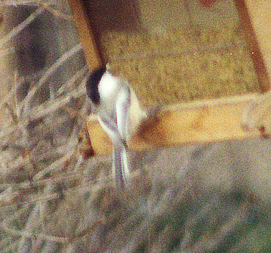English
chickadeeArapaho
1. híco'ooteehíhi' ; 2. bííceiyéíhii ; 3. sésiicébi’oo[t]Translation of Arapaho
2. ‘the one who brings the warm season’ ; 3. ???Location
Mountain Chickadees are found in the mountains. Black-capped Chickadees are found along the rivers and in areas with many trees, such as around St. Michael’s Mission and the Tribal Offices at Ethete.
Chickadees and the Arapaho
The ending of the first name is a diminutive suffix, meaning “little one.” The second name describes the bird’s mating call: biicei’i. This imitation of the sound also translates into Arapaho as ‘it is summer/warm season’ in Arapaho, and thus the chickadee’s mating call is seen as a sign of coming spring by Arapahos (and as a sign that the chickadee is speaking Arapaho)
The third word appears to be the same as that used in Kroeber (Traditions, pp. 73-74, 154): <sasshechabihi>, described as simply a “small animal.” That bird becomes the victim of the trickster Nih’oo3oo: Nih’oo3oo gets himself in trouble through sexual indiscretions, but borrows the penis of the sesiicebi’oo in order to convince people that he could not be the guilty party (“Nih’oo3oo and the Two Maidens”). Nih’oo3oo later attempts to borrow the bird’s small penis a second time (“Nih’oo3oo and the Mouse”). The same bird acts as a messenger on another occasion for a mythical Bone Buffalo, carrying its words to the camp of the humans and relaying messages. This bird is described as being very clever, and eventually gets tired of this task. The stories all seem to pick up generally on the conspicuous, “friendly” and “talkative” nature of the chickadee.

A Black-capped Chickadee at a bird feeder